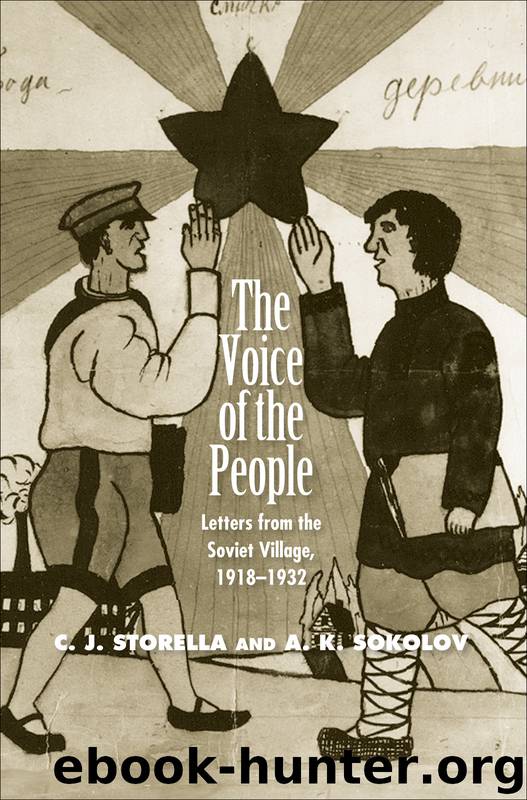The Voice of the People by C. J. Storella & A. K. Sokolov

Author:C. J. Storella & A. K. Sokolov
Language: eng
Format: epub
Publisher: Yale University Press
Published: 2013-03-14T16:00:00+00:00
Life among the Comrades
Distance from the political summit, lack of trustworthy information, ignorance, anti-Semitism, fear, and other factors contributed to people’s willingness to lend credence to the most outlandish rumors. Still, in large measure, personal experience shaped peasant views of the new regime, and the attitude of individual communists toward the peasantry helped determine that experience. Like the fictional Simkova and Klimov, Party members’ views were far from uniform, and this led to variations in practice. Veterans of the civil war, such as Klimov, may have been more willing to employ “administrative” and “command” methods in their dealings with the peasants. The following anonymous letter from a Kazakh village describes the effects of the attitude that Lenin frequently denounced as “communist arrogance.”
· 83 ·
An anonymous letter to Krestianskaia gazeta describing how local communists dominate village institutions, 19 May 1925. RGAE, f. 396, op. 3, d. 83, l. 21. Original manuscript.
___________
Why the peasants find the communists so terrifying.
It happened that I had to spend two years in our Red district executive committee in the village of Kazanskoe, Kokchetav county, Akmolinsk province. When I arrived to spend the night, some peasants were gathering around and began to inquire how things were going. “Not badly,” I answer. And before long we get to the point where they are asking, “Do you have many communists [where you live]?” “Not a single one,” I answer.
“[Then] the people are fortunate. We have thirty of them. They do whatever they want. We have already completely abandoned the village assembly; we just don’t go.”
I ask [them], “Why don’t you go to the assembly?”
They answer me, “What’s the point of going? It make’s no difference whether we’re there or not. If someone has to speak up for his interests, he is deprived of his right to vote then and there or is arrested. Eighty-eight of our people cannot vote, and more than half the village want to leave just to get away from the communist officials.”
Later on in the evening, I myself, personally, had to attend a general assembly to verify all this. I saw that no more than twenty people showed up for the general [village] assembly, and those that did were like frightened crows. And the Party members, like prewar gendarmes, are on the lookout for anyone who expresses an opposing [view]!
It’s resolved—the end! And who there could make a decision if they need two hundred people and only twenty show up and they can’t decide [anything?] Only three do—the village soviet chairman and the two others sitting beside him. And whoever dared to oppose them trembles in his skin—they take away his right to vote. But this frightens the peasants less than arrest. It is quite apparent that in the end our communists do not try to gain the trust of the peasants. Quite the opposite. They frighten [them] with various repressive [measures] and set themselves up as commanding officials. [They] do not serve as models for the working peasantry, but, on the contrary, each tries
Download
This site does not store any files on its server. We only index and link to content provided by other sites. Please contact the content providers to delete copyright contents if any and email us, we'll remove relevant links or contents immediately.
Investing For Dummies by Eric Tyson(2931)
The Book on Rental Property Investing by Turner Brandon(1805)
The Book On Tax Strategies for the Savvy Real Estate Investor by Amanda Han & Matthew MacFarland(1706)
Every Landlord's Legal Guide by Janet Portman & Stewart Marcia & Ralph Warner(1660)
The Thibaults by Roger Martin Du Gard(1593)
Personal Finance For Dummies (9th Edition) by Eric Tyson(1556)
Real Estate Licensing Exams by Raymond D. Modglin(1542)
Investing 101 by Michele Cagan(1391)
The Plaza by Julie Satow(1378)
Bill Bryson by At Home(1351)
Now I Sit Me Down by Witold Rybczynski(1319)
Irrational Exuberance by Shiller Robert J. J(1290)
The Real Book of Real Estate by Robert T. Kiyosaki(1272)
Real Estate License Exams For Dummies by Yoegel John A(1255)
7 Steps to Wealth by John L. Fitzgerald(1239)
Real Estate Math Demystified by Steven P. Mooney(1219)
Mortgages 101 by David Reed(1200)
The Business of Flipping Homes by William Bronchick(1197)
SAP Flexible Real Estate Management by Jayant Daithankar(1195)
